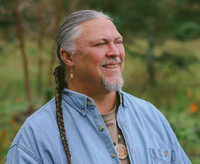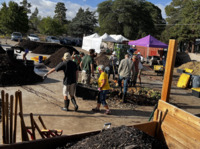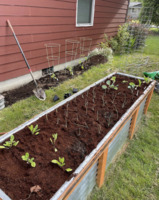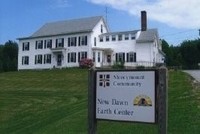Search
83 items
-
Becoming a CreatureKind Institution
“Having compassion for others begs the question of who ‘the others’ are. The animals whom we farm are sentient beings and individuals in their own right, even when they are crowded together in barren cages or windowless sheds. They are surely – in their billions – ‘others’ who deserve and desperately need our compassion. I wish CreatureKind great influence in bringing compassion to these fellow-beings of ours.”
– Joyce D’Silva, Ambassador Emeritus,
Compassion in World Farming
CreatureKind is a Christian animal welfare group that works to help institutions improve their practice as it impacts farmed animals, with benefits for humans, animals, and the environment. Becoming a CreatureKind institution means committing to a cycle of reviewing current sourcing, setting goals for improved practice, and acting on them, together with engaging your community about the program. The program have two major goals: reduce consumption of animal products and obtain remaining animal products from higher welfare. -
CreatureKind Church Course
CreaturKind has created a 6-week course to help Christians think about what their faith means for animals. The course is free and is meant to assist churches in learning about animal welfare and how to care for animals faithfully. They aim to encourage Christians to consider what they believe about God’s creatures and how they might move toward living out those beliefs as members of the body of Christ. -
Environmental Statement – Mennonite Church
Like many other religions, the Mennonite Church has released a statement about the need to take care of our environment. They are encouraging this attitude of caring for our planet among their members by using biblical text. It focuses on helping people choose simpler lifestyles, and seeking justice for the environment. -
Sustainability Photo Contest
This RESTORExchange photo contest is being brought back from the pre-COVID era, and with an added collaboration with the Sustainability Institute. It's based around the question "What does sustainability look like?" This can include sustainability in environmental justice, technology, energy, lifestyle and wellbeing, society and culture, economy and politics, and any other context where you see sustainability in action. We want to see your perspectives and show all the different places that sustainability is practiced! Winning photos will be decided by a panel of judges (yet to be determined), and the top four photos will win a prize! First place will receive $400, second place will receive $300, third place will receive $200, and an honorable mention will receive $100. Submissions will be accepted through March 15, 2023. -
Decolonizing Thanksgiving
"As we head into the Thanksgiving holiday weekend in the United States, it’s great to think about all the things we can be grateful for. It is good to have a time to pause and reflect, to participate in the seasonality of gratitude for the year’s bountiful harvest, and to gather with family and friends. (We’ll ignore the über-consumerism of the day following Thanksgiving…)
Many of us probably know by now, however, that the story many of us learned in school about the first Thanksgiving is rather inaccurate at best, and racist and paternalistic in many ways, with a focus on the Manifest Destiny idea of the divine mandate for Europeans to conquer the “New World” in the name of Christ and country.
A few questions come to mind (at least my mind), for those of us with European-American roots, such as:
Should we even celebrate Thanksgiving, since it’s so tainted with colonialism?
What might it look like to “decolonize” our own understandings and our culture?
How can we do this work in a way that encourages our own folks to partner, rather than making them (our White brethren) feel further ostracized, but while also speaking real truth?
What can we do this Thanksgiving to begin to reconcile relationships damaged in the colonial era, both human to human and human to this land?" -
Checking on the Chickens With the Next Generation
"Checking on the chickens with the next generation. We built the coop from recycled materials, the chickens eat much of our food waste, provide eggs, and encourage us to think about the cycle of our consumption and how we can be more sustainable. We want our son to approach his entire life this way, and these chickens will be his responsibility as soon as able. We live in the city of Columbus so we try to bring a different lifestyle to city living."
Taken by Grace Freeman. Submitted to the Sustainability Photo Contest. -
EPN Signature Earth Day Event - Monday, April 22, 2024: Eat This Earth Day! Ohio's Native Plants for Food
"Ohio State’s Environmental Professionals Network, in collaboration with the Chadwick Arboretum and Learning Gardens and native plant enthusiasts from across the state, proudly invite you to eat and drink from Ohio’s native plants this Earth Day! Discover through your senses, the edible flora of the Buckeye State. Over long periods of history, through the tastes, smells, and eyes of diverse native wildlife and human cultures, both ancient and present, these plants have sustained life."
This event will take place on Earth Day, April 22, 2024 from 4:45 pm to 7:30 pm. Admission is free and the event will be held at the Fawcett Center in Columbus, Ohio. Food and drinks will be provided. -
Eat Close To The Ground!
"Eat Close To The Ground!" Taken by Linda Sterling. Submitted to the RESTORExchange Sustainability Photo Contest. -
Exploring Fresh Produce in a Chinese Wet Market
"Exploring Fresh Produce in a Chinese Wet Market: The diverse array of vegetables is what I long for the most about my homeland China, and there is no better place to shop for vegetables than wet markets, where produce is locally sourced. This is what sustainability looks like for me––where people eat green and shop locally. The photo features a typical vegetable stall at Tuandao Market in Qingdao, my partner’s hometown, where we savored last year’s summer together." Taken by Mianmian Fei. Submitted to the RESTORExchange Sustainability Photo Contest. -
Gateway Into Sustainability
"This photo depicts a gateway into sustainability. Portraying a pathway into a huge lush garden. I believe gardens of any kind are a sustainable practice. That brings people closer to the earth while also providing a variety of amenities for said people. Not to mention the wildlife that flourishes too.This photo was taken in the fall of 2022 at the botanical gardens in Madison WI. In my mind I envision you’re entering a new world which is a lush paradise. Among that it’s filled with vocal birds, reptiles of all kinds, an array of colorful flowers. On the flip side I also envision as if you’re leaving the suffocating, bland concrete world behind." Taken by Logan Gosse. Submitted to the RESTORExchange Sustainability Photo Contest. -
Profile: Paula Penn-Nabrit (Founder of The Charles Madison Nabrit Memorial Garden)
Paula Penn-Nabrit's autobiography (from her website):
"Spiritually, I’ve been blessed as a practicing Christian, a 4th generation member of The Church of Christ of the Apostolic Faith, the same apostolic/pentecostal church my great-grandparents joined 100+ years ago.
Physically, I’m blessed as an 8th generation, native-born American of the African diaspora. I’m blessed to be a widow who was happily married for 36 years, 8 months and 22 days to an incredible man, Charles “CMadison” Nabrit. And CMadison and I were incredibly blessed by the opportunity to parent and then homeschool three fabulous sons, twins Charles and Damon who arrived in 1980, and Evan who arrived in 1982.
Academically, I’ve been blessed by my parents’ willingness to help pay for my education first at Columbus School for Girls and then Wellesley College. And I was further blessed by their willingness to help CMadison fund my quest for that terminal degree at the Moritz College of Law at The Ohio State University.
Professionally, I continue to be blessed by decades of successful operation with my consulting firm, PN&A, Inc. www.nabrit.com/pna. I started PN&A, Inc. in 1986. Next in 1990 I convinced CMadison we could stay married and work together, then in 2007 we welcomed first Damon our tech guru and later Charles as researcher and presenter into the business and finally in 2009 Evan, our youngest and a freakishly brilliant artist, agreed to manage our freelance graphics and client videos. I’m blessed to see PN&A, Inc., a black, women-owned, family-run, information-based business moving into the 2nd generation.
Intellectually, I’ve been blessed to write several books, including Morning by Morning: How We Home-Schooled Our African-American Sons to the Ivy League @2003, Random House and most recently The Power of a Virtuous Woman @2012.
Personally, I’m blessed by my extended family. In 1980 with the birth of their first grandchildren my parents began a tradition of gathering their children, their children’s spouses and their grandchildren for dinner each Sunday after church. Attendance at Grandmother and GrandDad’s Sunday dinners has grown to include nine grandchildren. We miss CMadison and Daddy, but we continue to be blessed by their memory and their legacy." -
Engaged Organizations: A Rocha International
A Rocha International discuss their mission on their website:
"At A Rocha USA, our mission is to restore both people and places through collaborative, community-based conservation.
We resource Christians to care for creation where they live by building a network of hands-on conservation projects in communities across the nation. Through partnerships with individuals, churches, and community groups, we provide content, curriculum, and a network of support for improving local habitats and increasing biodiversity." -
Engaged Organizations: Buddhist Peace Fellowship
The Buddhist Peace Fellowship discuss their purpose and mission on their website:
"Shapes movements for ecological and social justice by sharing spiritual-political practices and resources. We come together from multiple lineages, Buddhist and otherwise, to support bold, creative, loving actions to block systemic harm, while building collaborative tools and gatherings that give us the strength to be with our suffering, in order to transform towards liberation." -
Engaged Organizations: Sisters of Mercy of the Americas
Sisters of Mercy of the Americas has both sponsored and co-sponsored faith based organizations that focus on ecological issues. One of the organizations is Mercy Ecospirituality Center. -
Engaged Organizations: Mercy Ecospirituality Center
Mercy Ecospirituality Center discuss their various environmental/spiritual offerings of their retreat center on their website:
"Mercy Ecospirituality Center of Mercy Ecology, Inc. is a sponsored work of the Sisters of Mercy. We are committed to reflection, education and living gently in mutual relationship with the Earth. We offer hospitality for those seeking solace and to refresh their spirit in the beauty of creation, as well as programs in ecospirituality.
The Benedictine monks of Elmira, NY gave the 39-acre property located in the rural beauty of Vermont to the Vermont Sisters of Mercy. Sisters Judy Fortune and Elaine Deasy directed it as Lumen Christi Retreat House for many years, but after Lumen Christi closed, a group of Sisters established it as an Ecospirituality Center, originally named Mercy Farm in 2010." -
Engaged Organizations: New Dawn Earth Center
New Dawn Earth Center offers sustainability educational programs and activities for both children and adults. As indicated on their Facebook website:
"The New Dawn Earth Center invites everyone to learn from, honor and celebrate the interconnectedness of all life. We aim to create a space where humans can be in relationship with Earth and thereby nurture their own spirit." -
Shinto Faith Statement on the Environment
Shintoism belief system maintains that all earthly entities have their own spirituality and that the natural environment and people are of blood kin. The Interfaith Center for Sustainable Development posted a Shinto faith statement on the environment, prepared by the Jinja Honcho (the representative body of all Shinto Shrines in Japan) on their website. -
Daoist Faith Statement on the Environment
The Interfaith Center for Sustainable Development posted a Daoist faith statement from The China Daoist Association on the environment on their website. The following statement excerpt is shown below:
"With the deepening world environmental crisis, more and more people have come to realize that the problem of the environment not only is brought about by modern industry and technology, but also has a deep connection with people’s world outlook, with their sense of value, and with the way they structure knowledge. Some people’s ways of thinking have, in certain ways, unbalanced the harmonious relationship between human beings and nature, and overstressed the power and influence of the human will. People think that nature can be rapaciously exploited.
This philosophy is the ideological root of the current serious environmental and ecological crisis. On the one hand, it brings about high productivity; on the other hand, it brings about an exaggerated sense of one’s own importance. Confronted with the destruction of the Earth, we have to conduct a thorough self-examination on this way of thinking." -
Confucian Statement on the Environment
This Confucian statement on the environment discusses the importance of appreciating the beauty of nature. Human exploitation has disrupted this beauty, causing an imbalance in harmony among all forms of life. Interfaith Center for Sustainable Development has posted the following statement on its website: -
Zoroastrian Ecology
The Interfaith Center for Sustainability posted a Zoroastrian statement on ecology on their website. The following is an excerpt discussing the seven bounteous creations:
"The role of mankind in the world is to serve and honor not just the Wise Lord but the Seven Bounteous Creations of the sky, water, earth, plants, animals, man, and fire—gifts of God on High to mankind on earth.
The great strength of the Zoroastrian faith is that it enjoins the caring of the physical world not merely to seek spiritual salvation, but because human beings, as the purposeful creation of God, are seen as the natural motivators or overseers of the Seven Creations. As the only conscious creation, mankind has the ultimate task of caring for the universe." -
Druze Theology of the Forests
A Druze theology of the forests statement emphasizes human responsibility to care for the Earth to maintain life harmony. There is a specific emphasis on forests and similar nature areas as these are conducive to worship and meditation. Interfaith Center for Sustainable Development posted the following statement excerpt on their website:
"Forests and natural reserves are sites conducive to worship, meditation and going beyond yourself and the purely material. But does this happen through misuse, avarice and destruction of the forests? Of course not. It happens because of an appreciation – through the forests – of the divine grace and wisdom in ordering the universe and placing the mind as an arbitrator that decides what could be beneficial and what is an impermissible violation. This is exactly as in our daily lives both for ourselves and our society where it is possible for us to transform suffering into joy, emotion into blessing and nature into a source of bliss and worship." -
Sufism Ecology
This Sufism ecology statement posits that nature takes a central position in life - a place where one can find truth. Conservation and protection of the natural environment is a spiritual priority with the Sufism faith. The Interfaith Center for Sustainable Development posted this Sufism ecology statement on their website: -
Baha'i Faith Statement on the Environment
The Interfaith Center for Sustainable Development posted a Baha'i faith statement, from the Baha'i Office of the Environment, on their website. Below is the introduction within the statement:
"In this age of transition toward a world society, protection of the environment and conservation of the earth’s resources represent an enormously complex challenge. The rapid progress in science and technology that has united the world physically has also greatly accelerated destruction of the biological diversity and rich natural heritage with which the planet has been endowed. Material civilization, driven by the dogmas of consumerism and aggressive individualism and disoriented by the weakening of moral standards and spiritual values, has been carried to excess.
Only a comprehensive vision of a global society, supported by universal values and principles, can inspire individuals to take responsibility for the long-term care and protection of the natural environment. Baha’is find such a world-embracing vision and system of values in the teachings of Baha’u’llah, which herald an era of planetary justice, prosperity, and unity. " -
Hindu Ecology
Among other philosophical beliefs of Hinduism, adherents advocate for the sacredness of all life forms, simple living, and inner peace. This Hindu statement on ecology, compiled and edited by Ranchor Prime and published by the World Bank in 2003, is posted on the website for Interfaith Center for Sustainable Development:

























